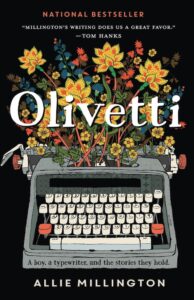July 18, 2024
Olivetti, by Allie Millington
“Who uses typewriters anyway?” so once posed The Bard, though it is a different kind of antique typewriter nostalgia that drew me to Allie Millington’s middle grade novel, Olivetti—I bought it for my daughter, who loved it and implored me to read it too. And let me tell you, there was no such thing as antique typewriter nostalgia during my childhood, when my dad worked for Olivetti and sold typewriters all over southern Ontario. Nobody, including me, realized just how hipster cool that was, and we had antique typewriters all over the house, and I have such visceral memories of their tactility, the feel of the keys, how the key arms would get all gummed up, the smoothness of the roller, how strange it was to see the alphabet disordered, the freedom of unrolling a ribbon, the spool leftover with a hole just perfect for sticking my finger, the mess of ink. I don’t think it’s such a leap that the daughter of an Olivetti salesman becomes a writer, born with the tools of the trade at her disposal—but when I was little “Olivetti” was just my dad’s work, a name to which my friends responded with blank faces when I told them what he did, and so it’s strange now to realize it has resonance, that Olivetti has meant something to an awful lot of people.
In Millington’s novel, Olivetti is a sentient typewriter who (as keeper of the stories) holds the key to the mystery when Beatrice Brindle goes missing. Her troubled youngest son Ernest is the one who has to figure out where his mother has gone, aided by the savvy daughter of a pawn shop owner whom Beatrice has sold Olivetti to before she fled to who-knows-where. This is a novel about heavy stuff—the family has finally come through Beatrice’s cancer treatment, and they’re still not over the stress and anxiety, and all our expectations about narrative and how a life proceeds suggest that everything should be happy and easy now, but it isn’t because life is not a book (even within this book), all tidy endings.
Millington strikes a careful balance between comfort and reality—my kid who still finds sad stories upsetting thought this story (which ends on an uplifting note) was really compelling. I really loved it too, and was so happy that she shared it with me.






